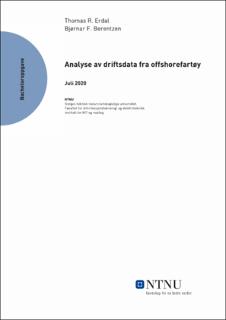| dc.contributor.advisor | Tomta, Gjermund | |
| dc.contributor.advisor | Bjørneseth, Ove | |
| dc.contributor.advisor | Myklebust, Tor Arne | |
| dc.contributor.author | Berentzen, Bjørnar | |
| dc.contributor.author | Erdal, Thomas | |
| dc.date.accessioned | 2021-09-24T18:39:26Z | |
| dc.date.available | 2021-09-24T18:39:26Z | |
| dc.date.issued | 2020 | |
| dc.identifier | no.ntnu:inspera:57756150:57764941 | |
| dc.identifier.uri | https://hdl.handle.net/11250/2782096 | |
| dc.description.abstract | Bachelorrapporten omhandler analysering av driftsdata fra to tilnærmet like offshorefartøy som driftes utenfor Norskekysten, der det ene fartøyet er ombygd til hybridskip og det andre fartøyet nytter kun fossile brennstoff. Oppgaven er gitt av Vard Electro AS og analysen gir svar på fordeler og ulemper ved bruk av batterisystemer på offshorefartøy.
Oppgaven er delt i to deler der første del går ut på å analysere driftsdataen og sammenligne resultatene mellom fartøyene for å se etter forbruk i dieselolje, samt andre verdier. Avgitt resultat vil vise til hvilket fartøy som forbruker minst drivstoff, og dermed er mest miljøvennlig. I del to vil det drøftes hvorvidt det er mulig å nytte hel-elektriske fartøy i offshorebransjen, ved hjelp av resultatet fra analysen.
Det vil også drøftes eventuelle feil som har oppstått under analyseringsprosessen og hvordan gruppen har valgt å løse oppgaven. | |
| dc.description.abstract | This bachelor thesis concerns analyzation of operating data between two almost identical offshore vessels that operates off the Norwegian coast, where one of the vessels is converted with hybrid propulsion and the other uses fossil fuel only. The assignment is given by Vard Electro AS and the analysis provides answers to the advantages and disadvantages of using battery systems onboard offshore vessels.
The task is divided into two parts where the first part is to analyze the operating data and compare the results between the vessels to look for consumption in diesel fuel, as well as other values. The results presented will indicate which vessel consumes the least fuel, thus most environmentally friendly. Part two will discuss the possibility to utilize fully electric vessels in the offshore industry, based on the results of the analysis.
It will also discuss any errors that have occurred during the analytical process and how the group has chosen to solve these problems. | |
| dc.language | | |
| dc.publisher | NTNU | |
| dc.title | Analyse av driftsdata fra offshorefartøy | |
| dc.type | Bachelor thesis | |
